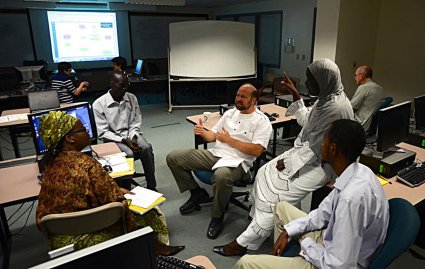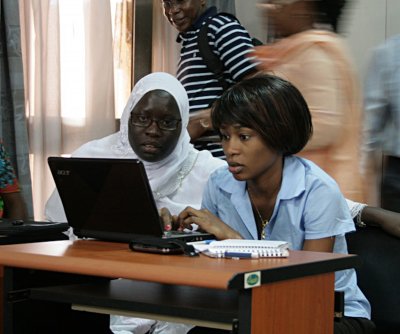EUGENE, Ore. — (Feb. 25, 2013) — More than 20 years ago the non-profit Network Startup Resource Center (NSRC), based at the University of Oregon, helped build some of the initial Internet infrastructure — providing hardware, networking support and technical training — on campuses in South Africa, Botswana, Namibia, Zimbabwe and, later, many others in Africa.
 These efforts — initially funded and still supported by the National Science Foundation and other core funding sources — have since spread around the world to universities requesting help, with a primary goal of training local technicians to build and maintain well-structured networks. To NSRC Director Steven Huter, the idea is to replicate the NSRC model at local levels so that the people empowered with technical information, tools and skills resulting from NSRC assistance can, in turn, reach out and train others in their local communities as a way to develop more critical mass of savvy network engineers and Internet technologists.
These efforts — initially funded and still supported by the National Science Foundation and other core funding sources — have since spread around the world to universities requesting help, with a primary goal of training local technicians to build and maintain well-structured networks. To NSRC Director Steven Huter, the idea is to replicate the NSRC model at local levels so that the people empowered with technical information, tools and skills resulting from NSRC assistance can, in turn, reach out and train others in their local communities as a way to develop more critical mass of savvy network engineers and Internet technologists.
The NSRC's outreach in Africa is now expanding under a new three-year, $3.2 million grant from Google.org, a team at Google focused on social impact. Under the grant, the NSRC will help to connect additional universities and research institutes while training more locally based operators so that they can link into the regional and international research-and-education network fabric, often in cooperation with governmental networks and industry.
 Google and NSRC share a similar goal of expanding global Internet access. Google also provided $1.25 million to the NSRC in 2011, which allowed the center to expand on-the-ground technical assistance with partner organizations in Asia/Pacific, Latin America and Africa.
Google and NSRC share a similar goal of expanding global Internet access. Google also provided $1.25 million to the NSRC in 2011, which allowed the center to expand on-the-ground technical assistance with partner organizations in Asia/Pacific, Latin America and Africa.
"This generous support from Google.org will allow us to focus more intensively on collaborations with African universities and African research and education networks," Huter said.
National Research and Education Networks are specialized Internet service providers (ISPs) that serve universities and research institutions, which often have some the most Internet savvy members of a community. These students often go on to become business and civil society leaders in the countries where they are educated.
"Access to the Internet promotes economic growth, improvements to education, the dissemination of knowledge and overall human development," Huter said. "In the last three years, numerous new fiber-optic investments have provided the African continent with 40 times more bandwidth, at more affordable prices, than previously existed. This is an opportune time to leverage the new investments in Africa, thereby improving infrastructure, and delivering relevant platforms and services, which is good for the whole Internet ecosystem."
►About the photos:
Top: Steven Huter of the Network Startup Resource Center and University of Oregon Libraries staff are working with colleagues from the National Archives of Senegal and the Université Cheikh Anta Diop de Dakar (University of Dakar) to plan and create the infrastructure for a digital archive.
Bottom: Khoudia Gueye Sy, left, NSRC network engineer and trainer from Senegal, assists a participant from a ccTLD registry in Africa during a session about building stable, secure Domain Name System (DNS) management techniques. Sy became an NSRC contractor after earlier receiving extensive technical training.
"The NSRC is one of the most productive institutions arising from the Internet community, and I know they will apply their grant wisely and effectively," said Vinton Cerf, vice president and chief Internet evangelist at Google. "It would be hard to overstate their contributions to increasing Internet access for everyone. I think of the NSRC as 21st-century pioneers, helping to open up new Internet territory."
A portion of the grant, Huter said, will allow the NSRC to work with other African nations to develop national network operator groups. Tanzania already has requested the NSRC's help to organize such a group that will include Internet developers from various service providers, industry, government and universities. The NSRC previously helped found the African Network Operators Group (AfNOG), the first on the continent, and similar groups in Nigeria and Ghana.
In addition to helping with direct engineering of wired and wireless infrastructure and technical training, the NSRC will work to: develop more Internet Exchange Points (IXPs); assist with strategies to obtain and expand fiber-optic networking; coordinate donations and shipments of networking books and equipment; and provide funding support to women network engineers to enhance their technical skills and educational opportunities.
The new work with Google's support will tie in nicely, Huter said, with recent investments by the European Commission in the creation of AfricaConnect with the UbuntuNet Alliance. This investment will connect more scientists and academics throughout Southern and Eastern Africa to peers in the region, to Europe and collaborators in the U.S. and Asia. There also are substantial investments underway to support the development of the West and Central African Research and Education Network (WACREN) to boost the flow and exchange of information via the Internet.
The NSRC has worked in more than 100 countries, often in collaboration with government leaders and agencies, in addition to university administrators and researchers. The outreach involves a core group of 20 personnel and hundreds of longtime volunteers from Internet organizations around the world.
"The National Science Foundation has a long history of helping research-and-education institutions obtain the network connectivity needed to participate in and contribute to science and research, and the NSRC has been providing valuable networking startup expertise to a wide range of international regions and institutions," said Alan Blatecky, director of NSF's Office of Cyberinfrastructure. "Without the critical startup expertise and information that NSRC provides, faculty, researchers and students at these institutions would not be able to participate in global science and research. NSF is especially pleased to see that these NSRC activities and efforts will be further leveraged and supported by Google."
 ♦ Boubakar Barry, coordinator
♦ Boubakar Barry, coordinator
Research and Education Networking Unit
Association of African Universities, Ghana
"The NSRC has been working with African higher education and research institutions for more than 20 years in building capacity for campus network engineers and operators of research and education networks.
"As National Research and Education Networks are more and more being established throughout the continent, catalyzed by the dramatically improving fiber infrastructure in Africa, the Association of African Universities has no doubt that this support from Google will enable the NSRC to contribute more in making a valuable difference in more institutions across Africa.
"The AAU looks forward to continued collaboration with the NSRC and the University of Oregon to enhance Internet access and network engineering expertise as part of this constructive phase of growth in Africa."
About the University of Oregon
The University of Oregon is among the 108 institutions chosen from 4,633 U.S. universities for top-tier designation of "Very High Research Activity" in the 2010 Carnegie Classification of Institutions of Higher Education. The UO also is one of two Pacific Northwest members of the Association of American Universities.
Media Contact: Jim Barlow, director of science and research communications, 541-346-3481, jebarlow@uoregon.edu
Source: Steven Huter, director of NSRC, 541-346-3547, sghuter@nsrc.org
Follow UO Science on Facebook: http://www.facebook.com/UniversityOfOregonScience